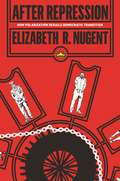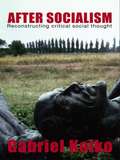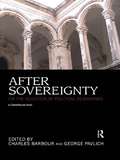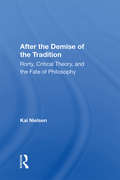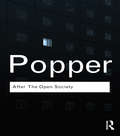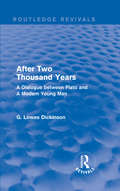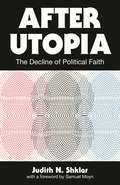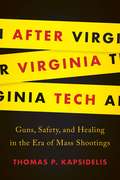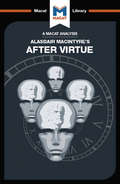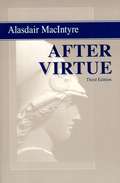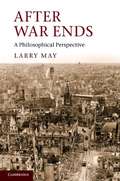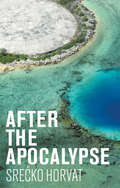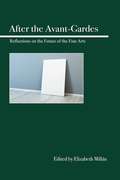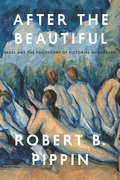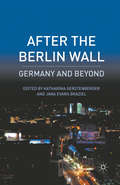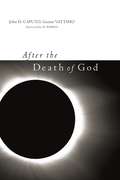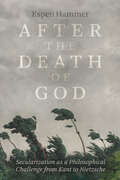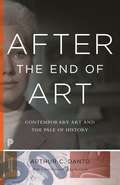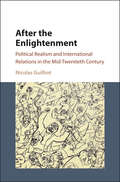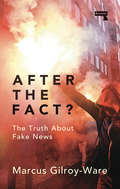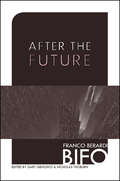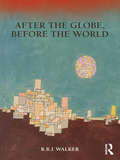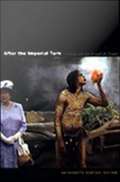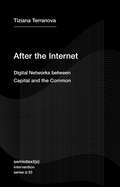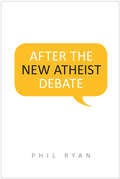- Table View
- List View
After Repression: How Polarization Derails Democratic Transition (Princeton Studies in Political Behavior #24)
by Elizabeth R. NugentHow differing forms of repression shape the outcomes of democratic transitionsIn the wake of the Arab Spring, newly empowered factions in Tunisia and Egypt vowed to work together to establish democracy. In Tunisia, political elites passed a new constitution, held parliamentary elections, and demonstrated the strength of their democracy with a peaceful transfer of power. Yet in Egypt, unity crumbled due to polarization among elites. Presenting a new theory of polarization under authoritarianism, After Repression reveals how polarization and the legacies of repression led to these substantially divergent political outcomes.Drawing on original interviews and a wealth of new historical data, Elizabeth Nugent documents polarization among the opposition in Tunisia and Egypt prior to the Arab Spring, tracing how different kinds of repression influenced the bonds between opposition groups. She demonstrates how widespread repression created shared political identities and decreased polarization—such as in Tunisia—while targeted repression like that carried out against the Muslim Brotherhood in Egypt led opposition groups to build distinct identities that increased polarization among them. This helps explain why elites in Tunisia were able to compromise, cooperate, and continue on the path to democratic consolidation while deeply polarized elites in Egypt contributed to the rapid reentrenchment of authoritarianism.Providing vital new insights into the ways repression shapes polarization, After Repression helps to explain what happened in the turbulent days following the Arab Spring and illuminates the obstacles to democratic transitions around the world.
After Socialism: Reconstructing Critical Social Thought
by Gabriel KolkoDoes socialism have a future in the world of the twenty-first century? If not, what is the future for progressive politics? This is a major contribution to contemporary social and political thought written by one of the world's leading critical historians. Gabriel Kolko ask the difficult questions about where the left can go in a post-Cold War world where neoliberal policies appear to have triumphed in both the West and the former Soviet bloc. In trying to answer this, he interrogates both the origins and development of socialist ideas and the contemporary dynamics of the globalized economy dominated by American military, cultural and political might. While avoiding the temptations of either pessimism or utopianism, Kolko offers an original and practical solution about the way forward for a liberal politics.
After Sovereignty: On the Question of Political Beginnings
by Charles Barbour George PavlichAfter Sovereignty addresses the vexed question of sovereignty in contemporary social, political, and legal theory. The emergence, and now apparent implosion, of international capital exceeding the borders of known political entities, the continued expansion of a potentially endless 'War on Terror', the often predicted, but still uncertain, establishment of either a new international American Empire or a new era of International Law, the proliferation of social and political struggles among stateless refugees, migrant workers, and partial citizens, the resurgence of religion as a dominant source of political identification among people all over the globe – these developments and others have thrown into crisis the modern concept of sovereignty, and the notions of statehood and citizenship that rest upon it. Drawing on classical sources and more contemporary speculations, and developing a range of arguments concerning the possibility of political beginnings in the current moment, the papers collected in After Sovereignty contribute to a renewed interest in the problem of sovereignty in theoretical and political debate. They also provide a multitude of resources for the urgent, if necessarily fractured and diffuse, effort to reconfigure sovereignty today. Whilst it has regularly been suggested that the sovereignty of the nation-state is in crisis, the exact reasons for, and exact implications of, this crisis have rarely been so intensively examined.
After The Demise Of The Tradition: Rorty, Critical Theory, And The Fate Of Philosophy
by Kai NielsenThis ambitious book addresses the "end-of-philosophy" debate and the challenge it presents to contemporary philosophy, both continental and analytic. It is a chain of argument as well as a conversation conducted in the presence of the major contributors to that debate: the critics (especially Richard Rorty) of the dominantly Platonic-Cartesian-Kantian tradition on the one hand and its defenders on the other. Nielsen's account draws on Wittgenstein, Quine, Davidson, Habermas, and Foucault, among others. Nielsen takes Rorty's arguments seriously and insists that they demand a rethinking of the role of philosophy in a world in which the claims of relativism, nihilism, and historicism loom increasingly larger. But, unlike most who are impressed with the end-of-philosophy argument, he provides an original and constructive response: the development of a holistic, antifoundationalist account of philosophy that utilizes a form of critical theory and wide reflective equilibrium in carving out a positive role for a new kind of philosophy. This is an important book not just for philosophers but tor social theorists, for literary critics, and indeed for scholars in any field in which the status of knowledge has become problematic.
After The Open Society: Selected Social and Political Writings
by Jeremy Shearmur Karl Popper Piers Norris TurnerIn this long-awaited volume, Jeremy Shearmur and Piers Norris Turner bring to light Popper's most important unpublished and uncollected writings from the time of The Open Society until his death in 1994.After The Open Society: Selected Social and Political Writings reveals the development of Popper's political and philosophical thought during and after the Second World War, from his early socialism through to the radical humanitarianism of The Open Society. The papers in this collection, many of which are available here for the first time, demonstrate the clarity and pertinence of Popper's thinking on such topics as religion, history, Plato and Aristotle, while revealing a lifetime of unwavering political commitment. After The Open Society illuminates the thought of one of the twentieth century's greatest philosophers and is essential reading for anyone interested in the recent course of philosophy, politics, history and society.
After Two Thousand Years: A Dialogue between Plato and A Modern Young Man (Routledge Revivals: Collected Works of G. Lowes Dickinson)
by G. Lowes DickinsonFirst published in 1930, this book presents an imagined account of conversation between Plato and ‘A Modern Young Man’. In the first part, political and social institutions are considered and property, forms of government, socialism, the control of population, war and education, are discussed. The second part examines the idea of real Goods including the concepts of truth, art and love. In this work, the author sees Plato reaffirming his belief that real Goods come from some higher world, which it is the destiny of the spirits to pursue.
After Utopia: The Decline of Political Faith
by Judith N. ShklarA political philosophy classic from one of the foremost political thinkers of the twentieth centuryAfter Utopia was Judith Shklar’s first book, a harbinger of her renowned career in political philosophy. Throughout the many changes in political thought during the last half century, this important work has withstood the test of time. In After Utopia, Shklar explores the decline of political philosophy, from Enlightenment optimism to modern cultural despair, and she offers a critical, creative analysis of this downward trend. She looks at Romantic and Christian social thought, and she shows that while the present political fatalism may be unavoidable, the prophets of despair have failed to explain the world they so dislike, leaving the possibility of a new and vigorous political philosophy. With a foreword by Samuel Moyn, examining After Utopia’s continued relevance, this current edition introduces a remarkable synthesis of ideas to a new generation of readers.
After Virginia Tech: Guns, Safety, and Healing in the Era of Mass Shootings
by Thomas P. KapsidelisIn what has become the era of the mass shooting, we are routinely taken to scenes of terrible violence. Often neglected, however, is the long aftermath, including the efforts to effect change in the wake of such tragedies. On April 16, 2007, thirty-two Virginia Tech students and professors were murdered. Then the nation’s deadliest mass shooting by a lone gunman, the tragedy sparked an international debate on gun culture in the United States and safety on college campuses. Experiencing profound grief and trauma, and struggling to heal both physically and emotionally, many of the survivors from Virginia Tech and their supporters put themselves on the front lines to advocate for change. Yet since that April, large-scale gun violence has continued at a horrifying pace.In After Virginia Tech, award-winning journalist Thomas Kapsidelis examines the decade after the Virginia Tech massacre through the experiences of survivors and community members who have advocated for reforms in gun safety, campus security, trauma recovery, and mental health. Undaunted by the expansion of gun rights, they have continued their national leadership despite an often-hostile political environment and repeated mass violence. Kapsidelis also focuses on the trauma suffered by police who responded to the shootings, and the work by chaplains and a longtime police officer to create an organization dedicated to recovery. The stories Kapsidelis tells here show how people and communities affected by profound loss ultimately persevere long after the initial glare and attention inevitably fade. Reaching beyond policy implications, After Virginia Tech illuminates personal accounts of recovery and resilience that can offer a ray of hope to millions of Americans concerned about the consequences of gun violence.
After Virtue
by Jon W. ThompsonAlasdair MacIntyre’s 1981 After Virtue was a ground-breaking contribution to modern moral philosophy. Dissatisfied with the major trends in the moral philosophy of his time, MacIntyre argued that modern moral discourse had no real rational basis. Instead, he suggested, if one wanted to build a rational theory for morality and moral actions, one would have to go all the way back to Aristotle. To build his arguments – which are widely acknowledged to be as important as they are complex – MacIntyre relies on two critical thinking skills above all others: evaluation and interpretation. The primary goal of evaluation is to judge the strength or weakness of arguments, asking how acceptable a given line of reasoning is, and how adequate it is to the situation. In After Virtue, MacIntyre applies incisive evaluation skills to major positions and figures in moral philosophy one after the other – showing how and why Aristotle’s template remains a stronger way of considering moral questions. Throughout this process, MacIntyre also relies on his interpretative skills. As MacIntyre knows, clarifying meanings, questioning definitions, and laying down definitions of his key terms is as vital to advancing his arguments as it is to evaluating those of other philosophers.
After Virtue: A Study in Moral Theory (3rd edition)
by Alasdair MacintyreIn this classic work, Alasdair MacIntyre examines the historical and conceptual roots of the idea of virtue, diagnoses the reasons for its absence in personal and public life, and offers a tentative proposal for its recovery.
After War Ends
by Larry MayThere is extensive discussion in current Just War literature about the normative principles which should govern the initiation of war (jus ad bellum) and also the conduct of war (jus in bello), but this is the first book to treat the important and difficult issue of justice after the end of war. Larry May examines the normative principles which should govern post-war practices such as reparations, restitution, reconciliation, retribution, rebuilding, proportionality and the Responsibility to Protect. He discusses the emerging international law literature on transitional justice and the problem of moving from a position of war and possible mass atrocity to a position of peace and reconciliation. He questions the Just War tradition, arguing that contingent pacifism is most in keeping with normative principles after war ends. His discussion is richly illustrated with contemporary examples and will be of interest to students of political and legal philosophy, law and military studies.
After the Apocalypse
by Srećko HorvatIn this post-apocalyptic rollercoaster ride, philosopher Srećko Horvat invites us to explore the Apocalypse in terms of ‘revelation’ (rather than as the ‘end’ itself). He argues that the only way to prevent the end – i.e., extinction – is to engage in a close reading of various interconnected threats, such as climate crisis, the nuclear age and the ongoing pandemic. Drawing on the work of neglected philosopher Günther Anders, this book outlines a philosophical approach to deal with what Horvat, borrowing a term from climate science and giving it a theological twist, calls ‘eschatological tipping points’. These are no longer just the nuclear age or climate crisis, but their collision, conjoined with various other major threats – not only pandemics, but also the viruses of capitalism and fascism. In his investigation of the future of places such as Chernobyl, the Mediterranean and the Marshall Islands, as well as many others affected by COVID-19, Horvat contends that the ‘revelation’ appears simple and unprecedented: the alternatives are no longer socialism or barbarism – our only alternatives today are a radical reinvention of the world, or mass extinction. After the Apocalypse is an urgent call not only to mourn tomorrow’s dead today but to struggle for our future while we can.
After the Avant-Gardes
by Elizabeth MillánA rallying call for all those who have been disquieted or disgusted by the excesses of artistic modernism. This is a collection of ten provocative essays on the arts, by writers of varied orientations who share a skepticism about the exaggerated role of modernism and the successive avant-gardes in shaping what is accepted as valid contemporary art. The essays cover painting and other visual arts, literature, music, and general observations about all the arts. It is not an exercise in hand-wringing about the current state of the arts, but looks for different directions in which the arts may now fruitfully evolve. Despite the diverse philosophies of the contributors, these essays together constitute a formidable case against the unhealthy impact of avant-gardism on our lives and aesthetic culture. The essays include the following, among others: a study of anti-modernist painter Odd Nerdrum, who sees modernist art as totalitarian; a critique of the avant-gardist neglect of mimesis as a key to art; an evaluation of "the end of art"; a critique of modern art in light of "the aesthetic harm principle"; an examination of Popper's objections to progressivism in music; the presentation of a new paradigm for literature.
After the Beautiful: Hegel and the Philosophy of Pictorial Modernism
by Robert B. PippinIn his Berlin lectures on fine art, Hegel argued that art involves a unique form of aesthetic intelligibility—the expression of a distinct collective self-understanding that develops through historical time. Hegel’s approach to art has been influential in a number of different contexts, but in a twist of historical irony Hegel would die just before the most radical artistic revolution in history: modernism. In After the Beautiful, Robert B. Pippin, looking at modernist paintings by artists such as Édouard Manet and Paul Cézanne through Hegel’s lens, does what Hegel never had the chance to do. While Hegel could never engage modernist painting, he did have an understanding of modernity, and in it, art—he famously asserted—was “a thing of the past,” no longer an important vehicle of self-understanding and no longer an indispensable expression of human meaning. Pippin offers a sophisticated exploration of Hegel’s position and its implications. He also shows that had Hegel known how the social institutions of his day would ultimately fail to achieve his own version of genuine equality, a mutuality of recognition, he would have had to explore a different, new role for art in modernity. After laying this groundwork, Pippin goes on to illuminate the dimensions of Hegel’s aesthetic approach in the path-breaking works of Manet, the “grandfather of modernism,” drawing on art historians T. J. Clark and Michael Fried to do so. He concludes with a look at Cézanne, the “father of modernism,” this time as his works illuminate the relationship between Hegel and the philosopher who would challenge Hegel’s account of both modernity and art—Martin Heidegger. Elegantly inter-weaving philosophy and art history, After the Beautiful is a stunning reassessment of the modernist project. It gets at the core of the significance of modernism itself and what it means in general for art to have a history. Ultimately, it is a testament, via Hegel, to the distinctive philosophical achievements of modernist art in the unsettled, tumultuous era we have inherited.
After the Berlin Wall: Germany and Beyond
by Beyond GermanyTwenty years after its fall, the wall that divided Berlin and Germany presents a conceptual paradox: on one hand, Germans have sought to erase it completely; on the other, it haunts the imagination in complex and often surprising ways
After the Death of God (Insurrections: Critical Studies in Religion, Politics, and Culture)
by Gianni Vattimo John CaputoIt has long been assumed that the more modern we become, the less religious we will be. Yet a recent resurrection in faith has challenged the certainty of this belief. In these original essays and interviews, leading hermeneutical philosophers and postmodern theorists John D. Caputo and Gianni Vattimo engage with each other's past and present work on the subject and reflect on our transition from secularism to postsecularism. <P><P>As two of the figures who have contributed the most to the theoretical reflections on the contemporary philosophical turn to religion, Caputo and Vattimo explore the changes, distortions, and reforms that are a part of our postmodern faith and the forces shaping the religious imagination today. Incisively and imaginatively connecting their argument to issues ranging from terrorism to fanaticism and from politics to media and culture, these thinkers continue to reinvent the field of hermeneutic philosophy with wit, grace, and passion.
After the Death of God: Secularization as a Philosophical Challenge from Kant to Nietzsche
by Espen HammerA fresh history of nineteenth-century philosophy’s many ideas about secularization. The secularization thesis, which held that religious belief would gradually yield to rationality, has been thoroughly debunked. What, then, can we learn from philosophers for whom the death of God seemed so imminent? In this book, Espen Hammer offers a sweeping analysis of secularization in nineteenth-century German philosophy, arguing that the persistence of religion (rather than its absence) animated this tradition. Hammer shows that Kant, Hegel, Feuerbach, Marx, and Nietzsche, each in their own way, sought to preserve and transform religion’s ethical and communal aspirations for modern life. A renewed appreciation for this tradition’s generous thought, Hammer argues, can help us chart a path through needlessly destructive conflicts between secularists and fundamentalists today.
After the End of Art: Contemporary Art and the Pale of History - Updated Edition (Princeton Classics #112)
by Arthur C. DantoOver a decade ago, Arthur Danto announced that art ended in the sixties. Ever since this declaration, he has been at the forefront of a radical critique of the nature of art in our time. After the End of Art presents Danto's first full-scale reformulation of his original insight, showing how, with the eclipse of abstract expressionism, art has deviated irrevocably from the narrative course that Vasari helped define for it in the Renaissance. Moreover, he leads the way to a new type of criticism that can help us understand art in a posthistorical age where, for example, an artist can produce a work in the style of Rembrandt to create a visual pun, and where traditional theories cannot explain the difference between Andy Warhol's Brillo Box and the product found in the grocery store. Here we are engaged in a series of insightful and entertaining conversations on the most relevant aesthetic and philosophical issues of art, conducted by an especially acute observer of the art scene today. Originally delivered as the prestigious Mellon Lectures on the Fine Arts, these writings cover art history, pop art, "people's art," the future role of museums, and the critical contributions of Clement Greenberg--who helped make sense of modernism for viewers over two generations ago through an aesthetics-based criticism. Tracing art history from a mimetic tradition (the idea that art was a progressively more adequate representation of reality) through the modern era of manifestos (when art was defined by the artist's philosophy), Danto shows that it wasn't until the invention of Pop art that the historical understanding of the means and ends of art was nullified. Even modernist art, which tried to break with the past by questioning the ways of producing art, hinged on a narrative. Traditional notions of aesthetics can no longer apply to contemporary art, argues Danto. Instead he focuses on a philosophy of art criticism that can deal with perhaps the most perplexing feature of contemporary art: that everything is possible.
After the Enlightenment: Political Realism and International Relations in the Mid-Twentieth Century
by Nicolas GuilhotAfter the Enlightenment is the first attempt at understanding modern political realism as a historical phenomenon. Realism is not an eternal wisdom inherited from Thucydides, Machiavelli or Hobbes, but a twentieth-century phenomenon rooted in the interwar years, the collapse of the Weimar Republic, and the transfer of ideas between Continental Europe and the United States. The book provides the first intellectual history of the rise of realism in America, as it informed policy and academic circles after 1945. It breaks through the narrow confines of the discipline of international relations and resituates realism within the crisis of American liberalism. Realism provided a new framework for foreign policy thinking and transformed the nature of American democracy. This book sheds light on the emergence of 'rational choice' as a new paradigm for political decision-making and speaks to the current revival in realism in international affairs.
After the Fact?: The Truth about Fake News
by Marcus Gilroy-WareWhy do we no longer trust facts, experts and statistics? In this essential guide to the turbulent times in which we live, Marcus Gilroy-Ware investigates our era of post-truths and fake news and answers the question of where we can go from here.We are supposed to have more information at our disposal now than at any time in history. So why, in a world of rising sea levels, populist leaders, resurgent fascism and a global pandemic, do so many people believe bizarre and untrue things about the world we live in? In After the Fact?, Marcus Gilroy-Ware shows us what really created the conditions for mis- and disinformation, from fake news and conspiracy theories, to bullshit journalism and the resurgence of the far-right, and why liberal newspaper columnists and centrist politicians are unable to turn back this tide. Spanning politics, culture, psychology, journalism, and much more, After the Fact? is a timely wake-up call for those who believe we can simply go "back to normal", and instead argues that, if we are to put an end to "fake news" we must deal with the broader social crises that are responsible for it.
After the Future
by Franco Bifo Berardi Ph.D. Nicholas Thoburn Gary GenoskoAfter the Future explores a century-long obsession with the concept of the "future," starting with Marinetti's "Futurist Manifesto," tracing it through the punk movement of the early 70s, and into the media revolution of the 90s. The future, Bifo argues, has come and gone, the concept has lost its usefulness. Now it's our responsibility to decide what comes next.
After the Globe, Before the World
by RBJ WalkerThis book explores the implications of claims that the most challenging political problems of our time express an urgent need to reimagine where and therefore what we take politics to be. It does so by examining the relationship between modern forms of politics (centred simultaneously within individual subjects, sovereign states and an international system of states) and the (natural, God-given or premodern) world that has been excluded in order to construct modern forms of political subjectivity and sovereign authority. It argues that the ever-present possibility of a world outside the international both sustains the structuring of relations between inclusion and exclusion within the modern internationalized political order and generates desires for escape from this order to a politics encompassing a singular humanity, cosmopolis, globe or planet that are doomed to disappointment. On this basis, the book develops a critique of prevailing traditions of both political theory and theories of international relations. It especially examines what it might now mean to think about sovereignties, subjectivities, boundaries, borders and limits without automatically reproducing forms of inclusion and exclusion, or universality and particularity, expressed in the converging but ultimately contradictory relationship between international relations and world politics.
After the Imperial Turn: Thinking with and Through the Nation
by Antoinette BurtonFrom a variety of historically grounded perspectives, After the Imperial Turn assesses the fate of the nation as a subject of disciplinary inquiry. In light of the turn toward scholarship focused on imperialism and postcolonialism, this provocative collection investigates whether the nation remains central, adequate, or even possible as an analytical category for studying history. These twenty essays, primarily by historians, exemplify cultural approaches to histories of nationalism and imperialism even as they critically examine the implications of such approaches. While most of the contributors discuss British imperialism and its repercussions, the volume also includes, as counterpoints, essays on the history and historiography of France, Germany, Spain, and the United States. Whether looking at the history of the passport or the teaching of history from a postnational perspective, this collection explores such vexed issues as how historians might resist the seduction of national narratives, what--if anything--might replace the nation's hegemony, and how even history-writing that interrogates the idea of the nation remains ideologically and methodologically indebted to national narratives. Placing nation-based studies in international and interdisciplinary contexts, After the Imperial Turn points toward ways of writing history and analyzing culture attentive both to the inadequacies and endurance of the nation as an organizing rubric. Contributors. Tony Ballantyne, Antoinette Burton, Ann Curthoys, Augusto Espiritu, Karen Fang, Ian Christopher Fletcher, Robert Gregg, Terri Hasseler, Clement Hawes, Douglas M. Haynes, Kristin Hoganson, Paula Krebs, Lara Kriegel, Radhika Viyas Mongia, Susan Pennybacker, John Plotz, Christopher Schmidt-Nowara, Heather Streets, Hsu-Ming Teo, Stuart Ward, Lora Wildenthal, Gary Wilder
After the Internet: Digital Networks between Capital and the Common (Semiotext(e) / Intervention Series #33)
by Tiziana TerranovaOn the internet's transformation from communication tool to computational infrastructure.The internet is no more. If it still exists, it does so only as a residual technology, still effective in the present but less intelligible as such. After nearly two decades and a couple of financial crises, it has become the almost imperceptible background of today&’s Corporate Platform Complex (CPC)—a pervasive planetary technological infrastructure that meshes communication with computation.In the essays collected in this book, written mostly between the mid-2000s and the late 2010s, Tiziana Terranova bears witness to this monstrous transformation. Mobilizing theories of cognitive capitalism, neo-monadology, and sympathetic cooperation, considering ideas such as the attention economy and its psychopathologies, and evoking the relation between algorithmic automation and the Common, she provides real-time takes on the mutations that have changed the technological, cultural, and economic ethos of the Internet. Mostly conceived, elaborated, and discussed in collective activist spaces, After the Internet is neither apocalyptic lamentation nor melancholic &“rise and fall&” story of betrayed great expectations. On the contrary, it looks within the folds of the recent past to unfold the potential futurities that the post-digital computational present still entails.
After the New Atheist Debate
by Phil RyanThe first decade of the twenty-first century saw a number of best-selling books which not only challenged the existence of god, but claimed that religious faith was dangerous and immoral. The New Atheists, as writers such as Richard Dawkins, Christopher Hitchens, Sam Harris, and Daniel Dennett have become known, sparked a vicious debate over religion's place in modern society.In After the New Atheist Debate, Phil Ryan offers both an elegant summary of this controversy and a path out of the cul-de-sac that this argument has become. Drawing on the social sciences, philosophy, and theology, Ryan examines the claims of the New Atheists and of their various religious and secular opponents and finds both sides wanting.Rather than the mutual demonization that marks the New Atheist debate, Ryan argues that modern society needs respectful ethical dialogue in which citizens present their points of view and seek to understand the positions of others. Lucidly written and clearly argued, After the New Atheist Debate is a book that brings welcome clarity and a solid path to the often contentious conversation about religion in the public sphere.
